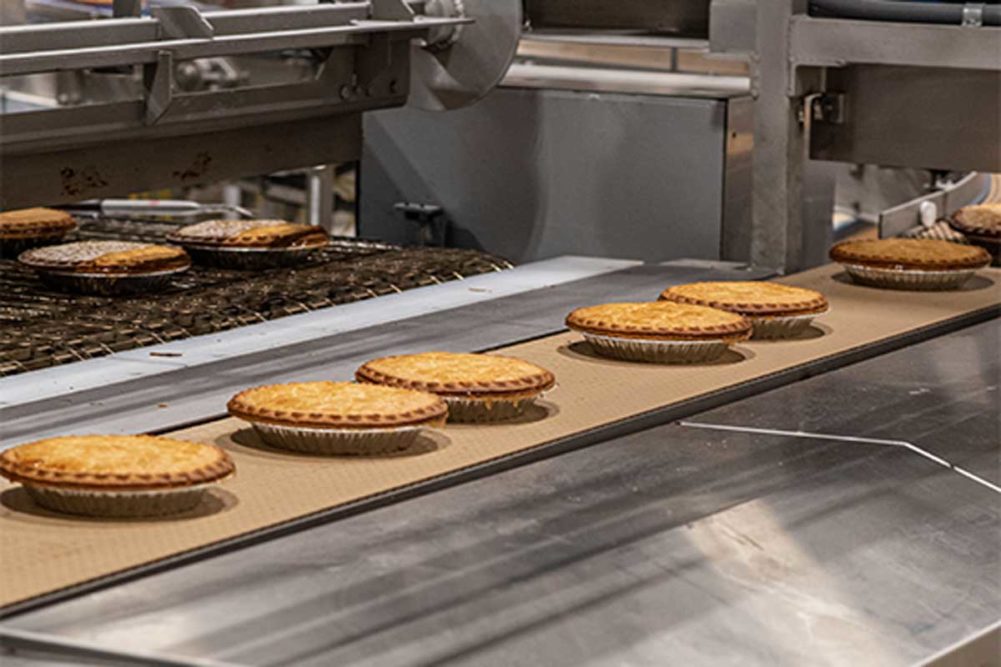Bakeries trying to install new equipment during the coronavirus (COVID-19) pandemic face the hurdle of keeping employees safe from exposure to the virus. This requires even more planning up front than a normal installation and some best practices to ensure the installation goes smoothly with minimal risk of exposure.
One major point is to limit the amount of people brought onsite for the installation. If the OEM doesn’t have a representative onsite, technology becomes the baker’s best friend. Whether using Zoom, Microsoft Teams, GoToMeeting or another platform, bakers need to ensure their internet connection can keep up with the needs of streaming video and audio.
Smart equipment, which allows suppliers to access the machine from their headquarters, has provided bakers an advantage during this isolating time. While some may be nervous about security risks these programs pose, there are measures that can be taken to protect against security breaches.
“COVID-19 is necessitating the buying of smart equipment so that the supplier can remotely monitor and diagnose,” said Jim Kline, president, The ENSOL Group. “The ability for equipment manufacturers to remotely monitor and program control systems remotely is essential to minimizing people on an install.”
Tippin’s, Kansas City, Kan., experienced this firsthand. Mark Boyer, president of Tippin’s said that the remote access provided on some of the bakery’s new equipment certainly helped ease the challenges COVID-19 brought.
“The OEM can see what’s going on in the equipment, so there was a fair amount of remediation done that way,” he said.
When third-party contractors do need to be onsite to assist with an install, there are precautions that bakeries can take to minimize the risk of a COVID-19 outbreak. Scheduling the installation when the bakery is closed and providing a dedicated entrance and space for outside crews minimize contact between bakery employees and outside visitors.
Health surveys and screenings are standard these days before anyone is allowed in a bakery plant, but these are only as good as the truthfulness of those answering. It’s crucial that bakers trust the contractors they employ.
“I see very few of the firms we work with willing to look at working with installation crews they don’t know and don’t have a relationship with because you’re very dependent on them,” Mr. Kline explained. “You want to know their people are being truthful about their exposure.”
Rebecca Abel, founder of D’Vine Cookies, recalled working with contractors who were not complying with mask mandates. Increasing the signage on the doors of the facility, implementing temperature checks and a contact-tracing log as well as having a zero-tolerance policy for noncompliance helped.
[Related reading: COVID-19 risk brings complexity to equipment installations]
“We learned that we had to create policies that we had to stick to across the board whether it was an employee, a contractor working on an installation or a visitor,” she said. “It was a hard and fast rule that no one was beyond our policy. This was a public health crisis, and no one is above these rules. We had to up our game of enforcing the rules and help people understand the rules to gain compliance.”
Tippin’s shut its new facility to outsiders, delaying its own grand opening celebration. Only team members and essential third-parties were able to enter the facility and only after a health questionnaire and temperature screening.
“We had to ask ourselves, ‘Is it going to be a setback for us if they can’t come in,’ before we would allow someone to come into the bakery,” Mr. Boyer said.
Another strategy is to install unit components early during regular scheduled downtime. With this strategy, Mr. Kline said his team compressed a major installation from 10 days to only four. Pre-wiring and other pre-work on smaller machines empowered the bakery to cut down the time the facility would be exposed to an outside crew.
“It’s expensive because you’re paying premium time as you’re working through the night and on weekends, but we did that so we could minimize the risk during the installation,” Mr. Kline explained.
While some lessons learned during this time may be incorporated into the future of installations — remote troubleshooting and thorough planning come to mind — one day, suppliers and contractors will be allowed more readily into bakeries to successfully install new production lines regularly. Until then, the industry has some strategies and best practices to get it through any essential installations. Plan, plan and then plan some more, and schedule around and screen out any COVID-19 risk.
This article is an excerpt from the March 2021 issue of Baking & Snack. To read the entire feature on remote equipment fulfillment, click here.





